
By Katie Meredith, Assistant to Institutional Advancement
Outside the classroom, Eastside Prep students are leaning into their passions to create a better world. These stories show us that innovation flourishes in community—the work of creating a better world doesn’t happen in isolation. Whether students are teaching one another, supporting youth around the world, exploring beneficial applications of AI, or sharing their voices on a global stage, their efforts make an impact that will last far beyond the day they graduate.
ANIKA (CLASS OF 2028)
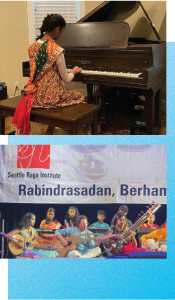 When Anika was five years old, her mother enrolled her in piano lessons at Seattle Raga Institute (SRI), and she soon discovered she had a passion for Indian classical music. Over her years at the studio, Anika has had the opportunity to help younger students learn music during summer sessions. “At the studio, the summer camps are really fun,” she said. “Each level has their own learning time, and you can learn a piece of music in just five days. I’ve been learning how to help the other kids, and with each student I help, I am getting better.”
When Anika was five years old, her mother enrolled her in piano lessons at Seattle Raga Institute (SRI), and she soon discovered she had a passion for Indian classical music. Over her years at the studio, Anika has had the opportunity to help younger students learn music during summer sessions. “At the studio, the summer camps are really fun,” she said. “Each level has their own learning time, and you can learn a piece of music in just five days. I’ve been learning how to help the other kids, and with each student I help, I am getting better.”
In 2022, Anika was chosen to play piano with the Seattle Raga Institute tour group, joining adults and children performing in venues throughout India, including the Kolkata region. For some performances, Anika represented SRI along with the Poetry on Drums group, accompanying traditional Indian kathak dance groups in performances.
The key lesson she learned from her experience touring in India was the value of building relationships and trust among performers. She said, “I think it’s important to get to know the people you’re working with. If you’re performing onstage, you know it’s not going to be perfect every time. When you know who you’re working with, you have trust with them. Even if you mess up, the others performing with you will have your back. The key is building trust among performers.” Anika loves music and hopes to continue playing Indian classical music in the future, both locally and around the world.
PRESTON (CLASS OF 2029)
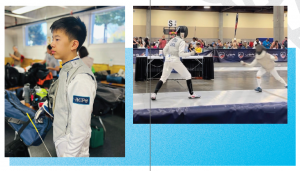 EPS has many student-athletes who compete in a wide variety of sports. One of those is Preston, who has learned life lessons and gained valuable skills through fencing. A few years ago, Preston’s mother enrolled him at Rain City Fencing Center (RCFC). Despite not having any previous experience, he soon began to master the basics and came to love the sport. He started fencing competitively in February 2023, and after just eight months, Preston placed fourth in our region and qualified for summer nationals in 2024.
EPS has many student-athletes who compete in a wide variety of sports. One of those is Preston, who has learned life lessons and gained valuable skills through fencing. A few years ago, Preston’s mother enrolled him at Rain City Fencing Center (RCFC). Despite not having any previous experience, he soon began to master the basics and came to love the sport. He started fencing competitively in February 2023, and after just eight months, Preston placed fourth in our region and qualified for summer nationals in 2024.
When he was just starting out, Preston found it difficult to keep his head in the game, especially if he was down by a significant amount of points. Over time, he’s learned how to focus and not give 34 up as easily. His coach has helped him develop an adaptive strategy, changing approaches when the current tactic isn’t working. “My coach says things like, ‘Don’t give up. If it’s not working, switch your strategy,’” he said.
Now, Preston is sharing his passion for fencing with others, including his younger brother. “I’ve started helping my younger brother with the basics; he’s eight now. He’s lucky to be starting fencing at a younger age than I did.” To other students who are thinking about starting fencing, Preston said, “It might be hard at the start, but soon you will get it. Don’t be discouraged and don’t give up.”
ARUSHI (CLASS OF 2025)
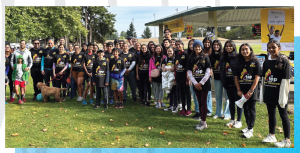 What would happen if youth supported youth, both locally and globally? Three years ago, Arushi was curious about the answer to that question. She was inspired by the mission of Child Rights & You (CRY), a nonprofit organization that supports underprivileged children in India by providing access to healthcare, food, and other necessities. Most children supported by CRY live in rural communities where families struggle with poverty. CRY works in many regions of India, partners with local grassroots organizations, and has impacted the lives of over three million children.
What would happen if youth supported youth, both locally and globally? Three years ago, Arushi was curious about the answer to that question. She was inspired by the mission of Child Rights & You (CRY), a nonprofit organization that supports underprivileged children in India by providing access to healthcare, food, and other necessities. Most children supported by CRY live in rural communities where families struggle with poverty. CRY works in many regions of India, partners with local grassroots organizations, and has impacted the lives of over three million children.
After connecting with CRY Seattle, Arushi decided to start a youth chapter. In summer 2020, Arushi and her youth team hosted their first 5K run/walk event in support of CRY Seattle. With the tagline “Take steps for children to live happier lives,” the goal was to involve youth in supporting the cause. “I think it’s important for kids to support other kids, even if those kids live on the other side of the world. Many young people want to make an impact—both locally and globally—and CRY is an organization that does that,” Arushi said.
Over the past three years, the CRY Youth Chapter 5K has become an annual event, raising about $8,000 in support of the mission. She said, “I think it’s important for youth to be involved in causes like this because when youth support youth, that inspires new ideas.” Arushi encourages her peers to discover their passions and find organizations that support those values. She’s learned that working with others who share her values is a key to initiating change. “As more students join our cause, we’ve formed a tight-knit community. We share similar passions and a desire to help underprivileged children in India. Those common values make it easy for us to work together and make a lasting impact.”
WILLIAM (CLASS OF 2024)
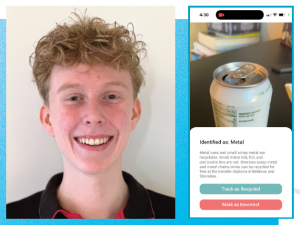 Have you ever been confused about what materials you can recycle? As a junior, William was inspired to eliminate barriers to proper recycling. He partnered with friends Tyler, Isobel, James, and Zarak (all Class of 2024) to start a nonprofit called The Plastic Project. William said, “At that time, I remember developing a passion for AI and technology and how they intersect with society. That’s what led me to start thinking about creating an app that uses AI technology.”
Have you ever been confused about what materials you can recycle? As a junior, William was inspired to eliminate barriers to proper recycling. He partnered with friends Tyler, Isobel, James, and Zarak (all Class of 2024) to start a nonprofit called The Plastic Project. William said, “At that time, I remember developing a passion for AI and technology and how they intersect with society. That’s what led me to start thinking about creating an app that uses AI technology.”
Through William’s curiosity about intersections between AI, sustainability, and society, the RecycleScan app was born. He entered the app in a competition called MIT Solve, which helped the app gain support and exposure. He applied and secured funding through three grants from environmental organizations Roots & Shoots and The Climate Initiative.
With RecycleScan, you use your phone to scan a piece of waste; then an AI algorithm will classify the waste and help you dispose of it using current guidelines from the City of Kirkland. The app can also classify electronic waste, such as phones, laptops, and smartwatches. Over the summer, William met with the City of Kirkland, and they made suggestions for the second iteration of the app, which launched in October 2023. “The app has now scanned over 300 items, and we’ve been well-received among schools, parents, and the Kirkland community,” William said.
In the future, William wants to continue improving the app and generating data for more locations around the world. The Plastic Project has applied to join the U.N. Sustainable AI Board, which seeks to explore the intersection of AI and environmental sustainability. Moving forward, William’s hope is that society learns to embrace AI responsibly. “We are entering a new digital age with AI—it’s more powerful and generative than ever before. We need to break free from old ways of using technology and embrace what is new.” To learn more about The Plastic Project and download the app, visit theplasticproject.org
SANJANA (CLASS OF 2024)
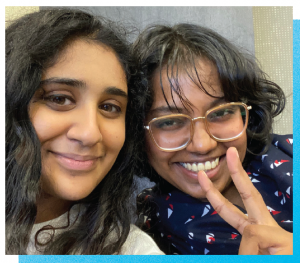 During the COVID-19 lockdowns, Sanjana, Annika, and Emmy (all Class of 2024) started discussing climate change over Teams. Their brainstorm resulted in EcoLearners, a youth-led nonprofit organization, which is dedicated to tackling climate change by empowering students worldwide to protect ecosystems. Today, EcoLearners is supporting chapters of youth throughout the U.S. and around the world.
During the COVID-19 lockdowns, Sanjana, Annika, and Emmy (all Class of 2024) started discussing climate change over Teams. Their brainstorm resulted in EcoLearners, a youth-led nonprofit organization, which is dedicated to tackling climate change by empowering students worldwide to protect ecosystems. Today, EcoLearners is supporting chapters of youth throughout the U.S. and around the world.
In 2021, EcoLearners was recognized by the United Nations (UN) for its youth-driven efforts to mitigate the impacts of climate change. This recognition is part of the UN’s Decade on Ecosystem Restoration, a global initiative set for 2021- 2030. The team was invited to speak at the United Nations Environmental Program Conference (UNEP) in September 2023 in Australia. Sanjana was able to attend the conference and had the opportunity to present about EcoLearners in one of the conference breakout sessions.
Sanjana presented to key stakeholders on a variety of topics, emphasizing the importance of engaging youth in their approach to the climate crisis. “I talked about how schools and governments should have environmental science curriculum, because it’s incredibly lacking in schools around the world. Youth need to be represented in large governing bodies; people in power have the ability to platform youth and to give them a voice,” she said.
In the future, Sanjana and her team hope to continue growing the impact of EcoLearners by adding more team members and continuing to partner with other organizations. Sanjana’s advice to other students would be to follow their passions because you never know what impact they may have. “If you asked me three years ago if I would be presenting for the UN, I wouldn’t believe you. People will tell you that you can’t make change, or maybe you don’t have what it takes, but if you’re really passionate about the cause, just go for it.” You can learn more about EcoLearners by visiting ecolearners.org.

